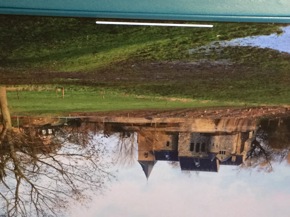34918Y188 When you arrive, the receptionist hands
Q&@
YOU A STANDARD
FORM AND ASKS YOU A PREDETERMINED SET OF QUESTIONS!
Your answers are forwarded to a nurse, who compares them with the hospital's regulations
in order to decide what preliminary tests to give you!? She then measures, say, your bloodpressure & heartrate,
& takes a bloodsample. The doctor on duty examines the initial test results, & follows a strict protocol in
determining which ward to admit you. In the ward you are submitted to much more thorough examinations,
such as an X-ray or an fMRI-scan, mandated by thick medical guidebooks. Specialists then analyze the results
according to well-known statistical databases, deciding whàt medicines to give you or what further tests to run?!
This algorithmic structure ensures that it does not réally màtter whó ìs the receptionist, nurse or doctor on duty!?
Their personality type, their political opinions & their momentary moods are irrelevant. As long as they all follow
the regulations & protocols, they stand a good chance of curing you. According to the algorithmic ideal, your fate
is in the hands of 'the system', & not in the hands of the flesh-&-blood mortals who happen to occupy this or that
post. What's true of hospitals is also true to armies, prisons, schools, corporations - & ancient kingdoms.
Of course ancient Egypt was far less technologically sophisticated than a modern hospital, but the algorithmic
principle was the same. In ancient Egypt too, most decisions were made not by a single wise person, but by a
network of officials linked together through papyri & stone inscriptions. Acting in the name of the living-God
Pharaoh, the network restructured human society and reshaped the natural world. For example,
pharaohs Senusret III & his son Amenemhat III, who ruled Egypt from 1878 BC to 1814 BC,
dug a huge canal linking the Nile to the swamps of the Fayum Valley.
An intricate system of dams, reservoirs & subsidiary canals diverted some of the Nile~waters
to Fayum, creating an immense artificial lake holding 50 billion
cubic meters of water~~~~~
YOU A STANDARD
FORM AND ASKS YOU A PREDETERMINED SET OF QUESTIONS!
Your answers are forwarded to a nurse, who compares them with the hospital's regulations
in order to decide what preliminary tests to give you!? She then measures, say, your bloodpressure & heartrate,
& takes a bloodsample. The doctor on duty examines the initial test results, & follows a strict protocol in
determining which ward to admit you. In the ward you are submitted to much more thorough examinations,
such as an X-ray or an fMRI-scan, mandated by thick medical guidebooks. Specialists then analyze the results
according to well-known statistical databases, deciding whàt medicines to give you or what further tests to run?!
This algorithmic structure ensures that it does not réally màtter whó ìs the receptionist, nurse or doctor on duty!?
Their personality type, their political opinions & their momentary moods are irrelevant. As long as they all follow
the regulations & protocols, they stand a good chance of curing you. According to the algorithmic ideal, your fate
is in the hands of 'the system', & not in the hands of the flesh-&-blood mortals who happen to occupy this or that
post. What's true of hospitals is also true to armies, prisons, schools, corporations - & ancient kingdoms.
Of course ancient Egypt was far less technologically sophisticated than a modern hospital, but the algorithmic
principle was the same. In ancient Egypt too, most decisions were made not by a single wise person, but by a
network of officials linked together through papyri & stone inscriptions. Acting in the name of the living-God
Pharaoh, the network restructured human society and reshaped the natural world. For example,
pharaohs Senusret III & his son Amenemhat III, who ruled Egypt from 1878 BC to 1814 BC,
dug a huge canal linking the Nile to the swamps of the Fayum Valley.
An intricate system of dams, reservoirs & subsidiary canals diverted some of the Nile~waters
to Fayum, creating an immense artificial lake holding 50 billion
cubic meters of water~~~~~
22 jun 2019 - bewerkt op 25 jun 2019
- meld ongepast verhaal
Log in om een reactie te plaatsen.
- O 25 nov 2025 5019139 Volgens Mar. 1:9 & Mat. 3:13 kwam YESJ van
- O 25 nov 2025 5019038 Als YESJ déze woorden uit Jesaja wèrkelijk
- O 24 nov 2025 50189 Blessed are the poor in spirit? Tegenwoordig
- O 24 nov 2025 5018837 We kunnen ons ook nu nog steeds de heilige
- O 24 nov 2025 5018736 Deze interpretatie van de betekenis van de
- O 24 nov 2025 50186 Zo kunnen we dus ook uit die myDi~euangelies
- O 24 nov 2025 5018535 De grote invloed van Yochanan op het volk
- O 23 nov 2025 5018434”myDisymboliek Afkomst Bronnen Ten Geleide”
- O 23 nov 2025 50183 Yaäkov, de broer van de Heer, werd als hoofd
- O 23 nov 2025 50182 Toen ze eenmaal hun broer erkend hadden als
- O 23 nov 2025 50181 Wat gebeurt met Yesj’ familie na zijn dood?
- O 22 nov 2025 5018033 Er lijkt ‘n emotioneel geladen situatie te
- O 22 nov 2025 50179 ‘Tot ‘n ander zei hij: “VOLG ME!” Maar hij…
- O 22 nov 2025 5017832 Bij een andere gelegenheid horen we dat ‘n
- O 22 nov 2025 50177 Er is echter één psychologisch
